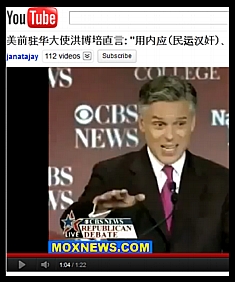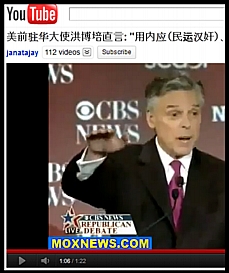[Links within blockquotes added during editing / translation]
When Ronald Reagan ran for the American presidency in 1980, he announced that he would switch diplomatic relations back to Taiwan: “no more Taiwans, no more Vietnams, no more betrayals of friends and allies.”
Imagine there had been the internet, back then. During a debate in Spartanburg, South Carolina on November 12, and in reply to other Republican candidates for the presidential nomination who addressed China’s trade policies as a major challenge for America, Jon Huntsman, until recently America’s ambassador in Beijing, apparently tried to come across as both China-savvy, and hawkish enough to strike a chord with his potential supporters. America needed no trade war with China. It would only “hurt our small businesses in South Carolina”:
[…] We don’t need that at a time when China is about to embark on a generational transition. So what should we be doing? So what should we be doing?We should be reaching out to our allies and constituencies within China. They’re called the young people. They’re called the Internet generation. There are 500 million Internet users…
Moderator: And Governor…
Huntsman: — in China…
Moderator: — we’re going to have to…
Huntsman: — now 80 million bloggers and they are bringing about change the likes of which is going to take China down.
Moderator: We’re going to have to leave it there.
Huntsman: — while we have an opportunity to go up and win back our economic…
Up!
Moderator: Governor…
Huntsman: — manufacturing muscle.
Moderator: That’s time.
Huntsman: That’s all I want to do as president.
Moderator: I thank you very much.
I’m not searching for angry Huanqiu Shibao comments this time – they will be in tune with what you’ll usually find there in similar contexts. But the Ministry of Toufu has translated some comments from Weibo, plus some context as the Ministry see it.
Anyway, let’s get back to Ronald Reagan. Supreme communications have always found their way into the enemy’s media, even three decades ago. You may remember that one:
My fellow Americans, I’m pleased to tell you today that I’ve signed legislation that will outlaw Russia forever. We begin bombing in five minutes.
That was in August, 1984 – and Reagan wasn’t seeking the Republican nomination. He was the president of the United States.
It was a monumental political scandal, Yuri Zhukov of the Pravda editorial board wrote in his reaction. Reagan had
But only few people in China can see the progressive strides the Republican party has made since. Why should anyone in China be angry? Huntsman just wanted to keep his electorate happy, without spoiling business with China. He doesn’t even want to argue about exchange rates. And if he really believes that he is the right man to “reach out” to Chinese netizens, he should be feared for his ignorance, but not for his “criminal energy”. Huanqiu readers at least have long understood that to make China great, they will have to remain slaves.
Lang Xianping (郎咸平) however does seem to see the headway GOP-totalitarian relations have made. A Chinese financial expert (according to chinaspeech.com) who popularizes economic issues, he appears to be much more concerned about Barack Obama than about any Republican candidate. America had abandoned Bush jr‘s unilateralism (放弃了单边主义), Lang wrote in a blogpost on Wednesday, but that didn’t mean that America had changed its hostile view of China (绝不可能改变对中国的敌视). Nobody should harbor illusions about Obama. Lang paints the picture of a president with unusual self-restraint who shows no emotions, who doesn’t play differences down (using the Jeremiah-Wright controversy as an example), and who doesn’t back down where others would.
Flexibility and “smart power” (or skillful power, 巧实力), rather than uniltateralism:
America has a president with such a strong image – what will be his influence on global trends? Obama’s constant claims on protection for the American economy – what does that mean for China?
那么,全球超级大国形象的美国再加上这样一位强势形象的总统,对于世界局势将产生怎样的影响?奥巴马一直宣称的保护美国经济,对于中国又意味着什么呢?
China was a nation which wanted face more than substance (or entrails, 里子), argues Lang.
Therefore, I believe, Obama will give us face on the surface, but they [America, apparently] will seek benefits [for themselves] in substance.
由于我们中国就是个要面子不要里子的民族,所以我认为奥巴马表面上会给足我们面子,而他们则尽量取得里子的实惠。
I’m not sure if Lang wasted any time on thinking about Huntsman.
____________
Related
» “Huntsman gives Romney Foreign Policy Lesson”, Huntsman, Nov 14, 2011
» Netizens should tolerate Censorship, March 26, 2011
» The Adequate Adversary, August 13, 2010
» BJRB: Hegemonists should Harbor no Illusions, Febr 6, 2010
Useful links stolen from Adam Cathcart.
____________


[…] temporary, too, just as they are at Argentine Radio and TV, and disputes over journalistic content don’t appear to…